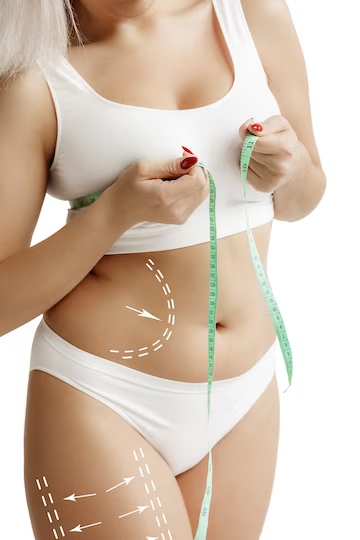Liposuction
Liposuction is a surgical procedure that removes unwanted fat deposits from specific areas of the body, such as the abdomen, thighs, hips, and arms. The goal of liposuction is to improve body contour and create a more proportionate appearance. It is not intended as a weight loss solution, but rather as a way to remove stubborn pockets of fat that are resistant to diet and exercise.
There are several types of liposuction techniques, but the most common technique involves the use of a cannula, a thin, hollow tube that is inserted through small incisions in the skin. The cannula is used to suction out the fat cells from the targeted area.
Liposuction can be performed under general anesthesia, local anesthesia, or IV sedation. The procedure typically takes a few hours, depending on the extent of the treatment area. Recovery time can vary, but most people are able to return to work and normal activities within a week or two.
It is also important that candidates for liposuction have realistic expectations for the results of the procedure. While liposuction can improve body contour and create a more proportionate appearance, it is not a magic solution and cannot fix all body issues.
Ultimately, the best way to determine if you are a good candidate for liposuction is to schedule a consultation with a board-certified plastic surgeon who can evaluate your individual needs and goals and recommend the most appropriate treatment plan.
Liposuction is not recommended for people who are significantly overweight or obese, or who have medical conditions that could increase the risks of surgery. It is important to consult with a board-certified plastic surgeon to determine if liposuction is a suitable option for you.
Am I a good candidate for liposuction?
Whether or not you are a good candidate for liposuction depends on several factors, including your overall health, body weight, and the specific areas of your body where you have unwanted fat deposits.
Liposuction is not a weight loss solution, and it is not recommended for people who are significantly overweight or obese. It is best suited for people who are within a healthy weight range but have isolated areas of fat that are resistant to diet and exercise.
Good candidates for liposuction should also have good skin elasticity, as the procedure involves removing fat from beneath the skin, which can leave loose or sagging skin if it does not bounce back properly. This is especially true for older patients or patients who have had significant weight fluctuations.
What are the risks and benefits of liposuction?
Like all surgical procedures, liposuction has potential risks and benefits. It is important to carefully consider these before deciding to undergo the procedure.
Benefits of liposuction:
Improved body contour and appearance: Liposuction can remove stubborn pockets of fat that are resistant to diet and exercise, resulting in a smoother, more toned appearance.
Increased self-confidence: Many people who undergo liposuction report feeling more confident and comfortable in their bodies after the procedure.
Risks of liposuction:
Infection: Any surgical procedure carries a risk of infection, which can range from mild to severe and potentially life-threatening.
Bleeding: Excessive bleeding can occur during or after liposuction, which may require further surgical intervention to control.
Bruising and swelling: It is normal to experience some degree of bruising and swelling after liposuction, which can take several weeks to subside.
Numbness and nerve damage: Liposuction can damage nerves in the targeted area, resulting in temporary or permanent numbness or altered sensation.
Uneven results: In some cases, liposuction may result in uneven or irregular contours, which may require additional surgery to correct.
Skin damage: The cannula used during liposuction can damage the skin, resulting in scarring, discoloration, or skin irregularities.
It is important to discuss the potential risks and benefits of liposuction with a board-certified plastic surgeon before deciding to undergo the procedure. They can help you understand what to expect and determine if liposuction is the best option for you.
How to get ready for liposuction?
If you are planning to undergo liposuction, there are several steps you can take to prepare yourself for the procedure and ensure the best possible outcome:
Schedule a consultation with a board-certified plastic surgeon: This is the first step in preparing for liposuction. Your surgeon will evaluate your individual needs and goals, discuss the procedure in detail, and help you determine if liposuction is the best option for you.
Maintain a healthy diet and exercise routine: While liposuction is not a weight loss solution, it is important to be in good physical health before the procedure. Eating a healthy diet and exercising regularly can help you achieve this.
Stop smoking: Smoking can increase the risk of complications during and after surgery, so it is important to quit smoking at least several weeks before the procedure.
Avoid blood thinners: Certain medications, such as aspirin and ibuprofen, can increase the risk of bleeding during and after surgery. Your surgeon will provide a list of medications and supplements to avoid before the procedure.
Arrange for a caregiver: You may need someone to help you with daily activities, such as dressing and bathing, during the recovery period. Make arrangements for a caregiver before the procedure.
Prepare your home: Make sure your home is clean and organized before the procedure, and arrange for any necessary medical equipment, such as a recliner or wheelchair.
Follow your surgeon's pre-operative instructions: Your surgeon will provide specific instructions to follow before the procedure, such as when to stop eating and drinking before surgery, and when to arrive at the surgical center.
By following these steps, you can help ensure a smooth and successful liposuction procedure and recovery.
How to take care of yourself after liposuction?
After liposuction surgery, taking care of yourself is crucial for a smooth and successful recovery. Here are some tips to follow:
Wear compression garments: Your surgeon will provide you with compression garments to wear after surgery. These garments help to reduce swelling, bruising, and aid in shaping the treated area. Wear them as instructed by your surgeon.
Take prescribed medications: Your surgeon may prescribe pain medications, antibiotics, and/or anti-inflammatory medications to help with pain and swelling. Take these medications as instructed.
Get plenty of rest: Allow your body to rest and recover after surgery. Avoid strenuous physical activities and follow your surgeon's recommendations for when to return to work and exercise.
Stay hydrated: Drink plenty of water to help flush out any remaining anesthesia and to help with healing.
Eat a healthy diet: A healthy diet can help speed up the healing process. Include plenty of fruits, vegetables, and lean proteins in your diet.
Monitor your incisions: Keep an eye on your incisions and report any signs of infection, such as redness, swelling, or drainage, to your surgeon.
Attend follow-up appointments: Attend all follow-up appointments with your surgeon to monitor your healing progress and make any necessary adjustments to your recovery plan.
By following these tips, you can help ensure a smooth and successful recovery after liposuction surgery.
How is the healing process and scarring after liposuction?
The healing process after liposuction can vary from person to person, but in general, you can expect to see improvement in the treated area within a few weeks to a few months. Here is what you can expect during the healing process and scarring after liposuction:
Swelling: Swelling is common after liposuction and may persist for several weeks. Your surgeon will likely recommend compression garments and lymphatic massage to help reduce swelling and improve the overall appearance of the treated area.
Bruising: Bruising is also common after liposuction and may take several weeks to subside. Your surgeon may recommend arnica cream or other topical treatments to help reduce bruising.
Scarring: Liposuction incisions are small and typically heal well with minimal scarring. Your surgeon will place the incisions in inconspicuous areas whenever possible to minimize visible scarring.
Results: You should start to see improvements in the treated area within a few weeks of surgery. However, the full results may not be visible for several months as your body continues to heal and adjust.
Follow-up appointments: It is important to attend all follow-up appointments with your surgeon to monitor your healing progress and ensure that any concerns are addressed promptly.
To help minimize scarring and ensure the best possible healing outcome, it is important to follow your surgeon's post-operative instructions carefully. This may include wearing compression garments, avoiding strenuous physical activity, and avoiding exposure to sunlight or heat in the treated area.









